Related Research Articles

Dewan Bahadur Sachivottama SirChetput Pattabhiraman Ramaswami Iyer, popularly known as Sir C. P., was an Indian lawyer, administrator and statesman, acknowledged as the most powerful man in the Madras Presidency in the decades immediately prior to Indian Independence.
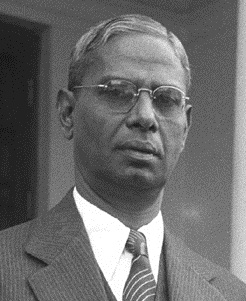
Sir Ramasamy Chetty Kandasamy Shanmukham ChettyKCIE was an Indian lawyer, economist and politician who served as first Finance Minister of India from 1947 to 1948. He also served as President of India's Central Legislative Assembly from 1933 to 1935 and Diwan of Cochin kingdom from 1935 to 1941.

Seshadri Srinivasa Iyengar CIE, also seen as Sreenivasa Iyengar and Srinivasa Ayyangar, was an Indian lawyer, freedom-fighter and politician from the Indian National Congress. Iyengar was the Advocate-General of Madras Presidency from 1916 to 1920. He also served as a member of the bar council from 1912 to 1920, the law member of Madras Presidency from 1916 to 1920 and as the president of the madras province Swarajya Party faction of the Indian National Congress from 1923 to 1930. Srinivasa Iyengar was the son-in-law of renowned lawyer and first Indian Advocate-general of Madras, Sir Vembaukum Bhashyam Aiyangar. Iyengar's followers called him Lion of the South.

Tamil Nadu Legislative Council was the upper house of the former bicameral legislature of the Indian state of Tamil Nadu. It began its existence as Madras Legislative Council, the first provincial legislature for Madras Presidency. It was initially created as an advisory body in 1861, by the British colonial government. It was established by the Indian Councils Act 1861, enacted in the British parliament in the aftermath of the Indian Rebellion of 1857. Its role and strength were later expanded by the second Council Act of 1892. Limited election was introduced in 1909. The Council became a unicameral legislative body in 1921 and eventually the upper chamber of a bicameral legislature in 1937. After India became independent in 1947, it continued to be the upper chamber of the legislature of Madras State, one of the successor states to the Madras Presidency. It was renamed as the Tamil Nadu Legislative Council when the state was renamed as Tamil Nadu in 1969. The Council was abolished by the M. G. Ramachandran administration on 1 November 1986. In 1989, 1996 and 2010, the DMK regime headed by M. Karunanidhi tried to revive the Council. The former AIADMK regime (2016-2021) expressed its intention not to revive the council and passed a resolution in the Tamil Nadu Legislative Assembly in this regard.

The Imperial Legislative Council (ILC) was the legislature of British India from 1861 to 1947. It was established under the Charter Act of 1853 by providing for the addition of 6 additional members to the Governor General Council for legislative purposes. Thus, the act separated the legislative and executive functions of the council and it was this body within the Governor General's Council which came to known as the Indian/Central Legislative Council. In 1861 it was renamed as Imperial Legislative Council and the strength was increased.

Sir Pazhamaneri Sundaram Sivaswami Iyer was a prominent lawyer, administrator and statesman who served as the Advocate General of Madras from 1907 to 1911.
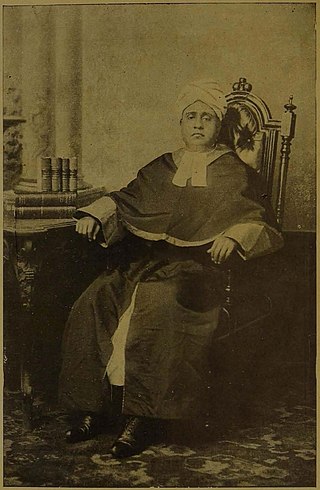
Venkatarama Krishnaswamy IyerCSI was an Indian lawyer who served as a justice of the High Court of Madras and on the Executive Council of the Governor of Madras known also as a leader in the second generation of the Mylapore clique.
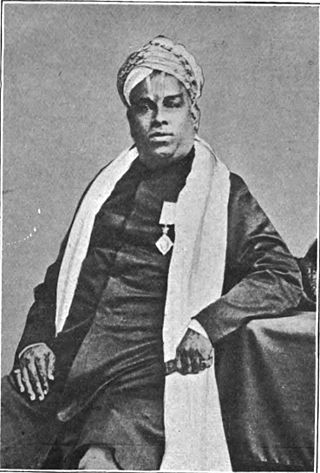
Vembaukum RamiengarCSI was an Indian civil servant and administrator who served as the Diwan of Travancore from 1880 to 1887.
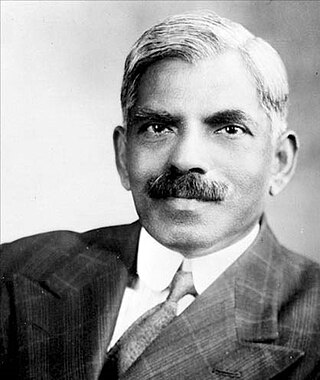
SirArcot Ramasamy Mudaliar was an Indian lawyer, diplomat, and statesman who was the first president of the United Nations Economic and Social Council and the 24th and last dewan of Mysore. He also served as a senior leader of the Justice Party and in various administrative and bureaucratic posts in pre- and Independent India. He was a prominent orator and was known for his inspiring speeches.

Diwan Bahadur SirVembakkam Bhashyam Aiyangar was a lawyer and jurist who served as the first Indian Advocate-General of the Madras Presidency and later, as a Justice of the High Court of Madras. As a Vakil he was the undisputed leader of the Madras bar, and, in his heyday, described as the 'greatest jurist in India'.

Gazulu Lakshminarasu ChettyCSI was an Indian merchant and political activist who founded the Madras Native Association, one of the earliest Indian political associations, and the first Indian-owned newspaper in Madras, The Crescent. He was also the second Indian to be appointed a member of the Madras Legislative Council, succeeding V. Sadagopacharlu on his death. Lakshminarasu Chetty was born in 1806 to a wealthy indigo merchant Sidhulu Chetty in Madras. On completion of his initial education, Chetty entered the family trade and succeeded as a businessman. He entered politics and devoted money for social and philanthropic causes.

Bezawada Ramachandra ReddyCBE was an Indian politician of the Justice Party and one of the founders of the Swatantra Party. He served as the President of the Madras Legislative Council from 1930 to 1937. Ramachandra Reddy was a relative of Indian National Congress politician Bezawada Gopala Reddy.
Diwan Bahadur Royapuram Nallaveeran Arogyaswamy Mudaliar was an Indian politician and civil engineer who served as the Minister of Excise, Medical Administration and six other departments in the Madras Presidency from 1926 to 1928.
Sir Vembakkam Comanduru Desikachariar was an Indian lawyer, politician and Indian independence activist who served as a member of the Madras Legislative Council from 1904 to 1908.
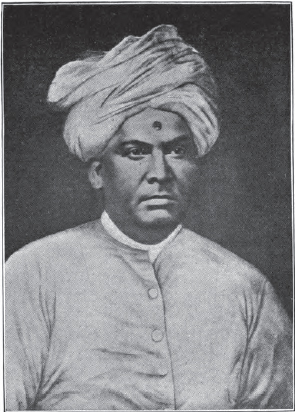
The Right Hon. Calamur ViravalliRunganada Sastri was an Indian interpreter, jurist, civil servant, polyglot, and social reformer, who was known for his mastery over Indian and foreign languages alike in both classical and vernacular forms, as well as his general erudition and command of jurisprudence.
Thomas Sydney Smith was an Indian lawyer who served as the Advocate General of Madras Presidency from 1861 to 1863. He was ex-officio a member of the Madras Legislative Council.
Henry Dominic Phillips was a British civil servant of the Indian civil service who served as an official member of the Madras Legislative Council from 1863 to 1868. He took his seat in December 1864.
Sir John Edward Power Wallis was a British lawyer who served as the Advocate-General of Madras from 1900 to 1906, and Chief Justice of the Madras High Court from 1914 to 1921.

The Vembaukum or Vembakkam family were one of the two preeminent Brahmin dynasties in the Madras Presidency who dominated the Mylapore clique, alongside the Calamur clan. They were originally Vadakalai Iyengars from Vembakkam in the Chingleput District of the Madras Presidency. The Law Weekly, a legal journal, has been edited and published by the family for over a century.
References
- ↑ N.S.Chandrasekhara (22 August 2016). Dewan Shashadri Aiyer. Publications Division Ministry of Information & Broadcasting. ISBN 9788123026572.
- Pamela G. Price (1996). Kingship and political practice in colonial India. Cambridge University Press. p. 97. ISBN 0521552478.
- Muthiah, S. (2004). Madras Rediscovered. East West Books (Madras) Pvt Ltd. p. 418. ISBN 81-88661-24-4.